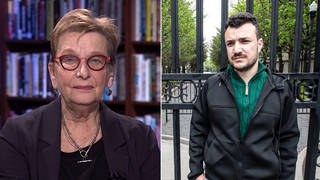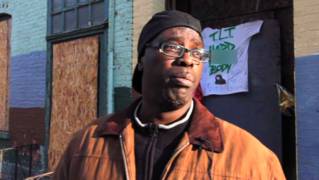
Guests
- Jon Alpertaward-winning journalist, documentary filmmaker, and co-founder and executive director of DCTV.
The New York City firehouse studio that housed Democracy Now! from 2001 to 2009 has reopened as a movie theater devoted to documentary films. The opening of Firehouse: DCTV’s Cinema for Documentary Film comes as Downtown Community Television celebrates 50 years of media activism and training. “We wanted to build something that really respected and paid tribute to documentaries,” says DCTV’s co-founder Jon Alpert, who says the theater is “completely interactive” and will “serve the community.” DCTV is also part of a broad alliance in the Chinatown neighborhood to stop the development of a new jail — a 300-foot-tall “jailscraper” — that Alpert says would likely be “the physical end” of DCTV. Alpert just won the News and Documentary Emmy Award for Outstanding Crime and Justice Documentary for the last part of his HBO trilogy, “Life of Crime: 1984-2020.”
Transcript
AMY GOODMAN: This is Democracy Now!, democracynow.org, The War and Peace Report. I’m Amy Goodman.
Tonight in New York City, the former home of Democracy Now!'s firehouse studio will open as Firehouse: DCTV's Cinema for Documentary Film. It comes as DCTV celebrates 50 years of media activism and training. The cinema’s ribbon cutting last week featured New York City Councilmember Christopher Marte and DCTV co-founder and co-executive director Keiko Tsuno.
KEIKO TSUNO: Fifty years ago, we never dreamed that this theater would become a reality. At that time, we started our theater from an old milk truck, and our audience of people from passing by. And so, this is something we never expected and never imagined. … With this new theater, we will be able to reach even more people and to transform more lives.
COUNCILMEMBER CHRISTOPHER MARTE: Many people here know Jon or Keiko through their international work, whether it’s going to Cuba and being one of the first documentarians to interview Fidel Castro, or his work in Russia or his work in the Amazon or his work in the Middle East. But here in the community, we know him for what he’s done here for decades, whether it is interviewing garment workers as they were taking on their bosses for exploitive working condition and working hours, or is using his TV truck along pantry lines to teach people how to speak English, where he would go up and read — help them read what’s on the screen, or documenting what happened to our community post-9/11 or through the pandemic, and now with this fight, stopping the world’s tallest jail from being constructed here in Chinatown and in Lower Manhattan.
AMY GOODMAN: For more on the opening of Firehouse: DCTV’s Cinema for Documentary Film, we’re joined by its co-founder and co-executive director Jon Alpert and by filmmaker Craig Renaud, who we’ll talk more with in a minute.
First, Jon, congratulations both on the opening of the cinema and also, just last night, you won another Emmy, this time it’s a News and Documentary Emmy for Outstanding Crime and Justice Documentary for your HBO film Life of Crime: 1984-2020, about three friends from Newark, New Jersey, and their addictions, who you have followed for decades. Welcome back to Democracy Now!, and congratulations.
JON ALPERT: Thanks, Amy. Listen, I was hoping we could actually be in the studio. Everybody at DCTV says, ”Democracy Now! T-shirts, please, please!”
AMY GOODMAN: Well, I wish we were right there with you in the firehouse studios. But it is so beautiful to see what you have created at DCTV right now. Can you talk about — well, take it where Chris Marte left off. Place this Firehouse Cinema for us, where it is, right there in Chinatown, what’s next door, and what you’re hoping to accomplish with it.
JON ALPERT: Well, it actually inhabits some of the former Democracy Now! studio. And so, the vibes that emanate from your presence there have really blessed us and inspired us.
We wanted to build something that really respected and paid tribute to documentaries. You’ve seen the theater. It’s the most beautiful theater in the city. It’s completely interactive. We can connect any two places in the world, so we can have discussions with Kazakhstan, we can have discussions with you. And it’s the documentary theater we would have liked to have had as we went through our career and sort of always got the dregs of whatever was in the film world. We’re documentary makers. We built it for the documentary community. And we want everybody to come there. You’ll see from the programming, from the gentleman that’s coming on next, that this is going to be a different type of theater, that’s going to serve the community. That’s the good news.
The bad news is that it’s 90 feet away from what is projected to be the first world jailscraper. This is a 40-story jail, $9.5 billion — no money for schools, no money for housing, no money for healthcare, but money for iron bars. I mean, it’s almost incomprehensible that somebody thinks that this is a good plan. Everybody in the community opposes it. It’s probably the physical end of DCTV if this gets constructed. It’s over for us. It’s absolutely over for the community. And we’re working trying to get the city to come to its senses, because we’ve got two perfectly good jails that have been built there recently that can just be readapted. If you readapt those jails and then take the savings and spend it on the things that prevent people from going to jail, giving opportunities to people, it’ll be wonderful. We hope that the city will come to its senses —
AMY GOODMAN: You know, just very quickly on that —
JON ALPERT: — because, otherwise, this new theater that we built is gone.
AMY GOODMAN: I remember —
JON ALPERT: Yeah.
AMY GOODMAN: — right next door to us, as we were there, too, broadcasting for years, was the Bernie Kerik detention complex. That’s what it was called, right down the street from you. And then they had to take down that sign when Bernie Kerik was actually imprisoned there, the former police commissioner of New York. But just for people to understand, and we want to move on from this, but it is so critical, when you say a “jailscraper,” what are you talking about?
JON ALPERT: We’re talking about a building that’s probably a third of the size of the Empire State Building that is a jail. You know, New York City has a hellhole for a jail right now with Rikers Island. And the plan is to build local jails in the community. Our community supports that, but we don’t support what’s basically a gigantic pork barrel scheme to defund everything else and just build iron bars. It’s a really bad idea.












Media Options